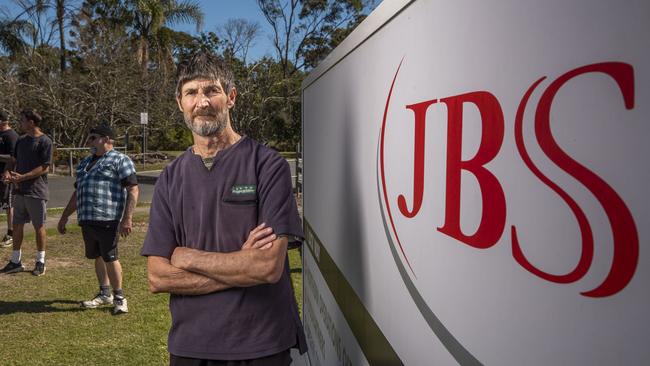Coronavirus: Abattoir shut down over JobKeeper-subsidised competition
Australia’s largest abattoir is facing an extended shutdown because of a market distortion created by the government’s JobKeeper scheme.

Australia’s largest abattoir is facing an extended shutdown, putting 1700 people out of work, because of a market distortion created by the government’s JobKeeper scheme.
The JBS meatworks in Dinmore, west of Brisbane, has been unable to get JobKeeper for its employees because its conglomerate owner has not lost a sufficient portion of its income.
Meanwhile, some of its competitors, which use labour hire companies that can show they have lost significant income, are driving up prices because their lack of labour overheads enables them to outbid JBS on already record-high meat prices.
The meatworks has been closed since last week and its entire workforce is expected to be stood down for at least a fortnight.
A JBS spokesman said the market imbalance created by the JobKeeper scheme meant the meatworks, which would likely qualify for JobKeeper if it was a stand-alone business, could not compete.
“The rationale behind JobKeeper was to support jobs and as a fiscal lever for the economy, but as our workers in Ipswich are experiencing first-hand, it is capable of distorting competition through subsidising labour, in a sector whose margins are already under considerable pressure,” he said.
“It’s been a struggle in 2020 to operate Dinmore. The impact of COVID on the viability of its operation plus the demand for protein internationally combined with having to compete for available livestock against other operators who are receiving JobKeeper has only made it even harder.”
Dave Phillips, who has worked at the meatworks for about 40 years, said there had been similar shutdowns influenced by high meat prices driven by climatic events, but not policy-induced.
“It has been like this before but that’s from climatic problems like floods where eventually it does dry out and get back to normal,” he said.
“At the moment, there is no light at the end of the tunnel for this one.”
Mr Phillips said many of his colleagues were distressed by the predicament and had already eaten into their savings over the past two months after the China dispute dropped their roster to three days a week.
“I don’t know what Canberra does; I think we’ve just fallen through the cracks,” he said.
The Australasian Meat Industry Employees Union has sided with JBS, calling on support from the ACTU and for changes to the JobKeeper scheme to make it more equitable.
The meatworks was one of four nationwide black-listed by China in May over alleged improper labelling of exported products, leading to a reduction in shifts.
Labor member for Blair Shane Neumann, whose first job was at a cleaner at the meatworks, said JBS was being punished for doing the right thing. “They’re getting penalised by those companies who are doing the wrong thing and engaging in labour hire and we end up with a situation where there is a JobKeeper-subsidised workforce being delivered into a meatworks that is competing against JBS with a full-time equivalent workforce,” he said.
“This company may not be suffering nationally, but locally it’s down about 60 per cent.”
Mr Neumann said Josh Frydenberg should either “exempt” JBS, giving the company access to JobKeeper, or crack down on companies exploiting the scheme.
He said the proposed pandemic leave scheme would give employees some certainty during shorter temporary stand downs.
The Treasurer did not comment on the specific case but said JobKeeper was supporting about 990,000 organisations and more than 3.5 million Australians.
“Businesses are eligible for the JobKeeper payment if they meet the turnover threshold of 30 per cent for those with an annual turnover of less than $1bn, or 50 per cent for those with an annual turnover of more than $1bn,” he said.




To join the conversation, please log in. Don't have an account? Register
Join the conversation, you are commenting as Logout